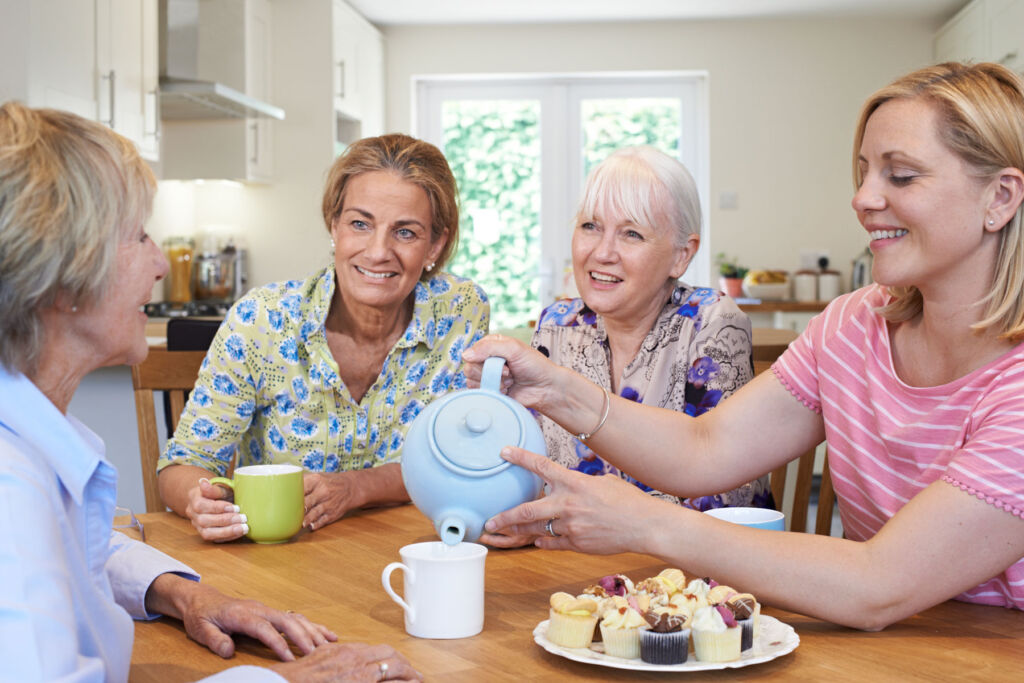

A report from the Health & Food Information Service details that a third of UK women have a nutrient deficiency, and more than half don’t think about their diets. For this article, Dr Carrie Ruxton explains the seven ages of women, from childhood to older, with age-specific nutrients needed for optimal health.
Recent research reveals that a third of UK women have been told they have a nutrient deficiency putting their health and wellness at risk – yet more than half (52%) don’t actively think about their diets.
That’s according to a report published¹ by the Health and Food Supplements Information Service (HSIS), ‘Diet Disasters for the Seven Ages of Women: How nutritional gaps are putting women’s health under threat across the lifecycle.’
The report found that three-quarters felt they lacked the right information to plan their diets. And while nearly six in 10 (57%) took a multivitamin and multimineral supplement, less than one in eight (13%) choose supplements specifically aimed at women.
Study co-author and HSIS dietitian Dr Carrie Ruxton says, “Across the seven ages of women – from childhood to older age–specific nutrients are needed for optimal health, as well as to support pregnancy, lactation, and menopause.
Women have unique vitamin, mineral, and fatty acid needs which, if they’re not met by diet, could lead to ill health or affect the development of the next generation. That’s why it’s important for women to think about the nutrient requirements for their own life stage and avoid a ‘one size fits all’ approach”.
The HSIS report takes a deep dive into the SEVEN AGES OF WOMEN and what these mean for women’s dietary needs:
The early years: vitamins A, C, D, and omega-3s


A growing girl needs a wide range of nutrients for healthy development, with vitamins A, C, and D being top priorities. In the early years of schooling, her brain needs support from omega-3s (good fats) and good hydration with tap water.
Food fussiness and refusal are common in the early years, which can impact a girl’s ability to get all the nutrients she needs. Combining a food-first approach with a paediatric multivitamin is a good way forward, but add in a fish oil supplement if she won’t eat oily fish.
Adolescence and teens: B vitamins, calcium, and iron
As she moves into her teenage years, a girl becomes more independent, making her own decisions about what she eats. This can be problematic for a body going through lots of changes – for example, skeletal growth spurts need calcium, and the onset of the menstrual cycle increases iron needs.
Skipping breakfast or following fad diets in a bid to look like her favourite influencer could result in inadequate intakes of B vitamins and fibre.
Sugar and empty-calorie junk foods can be tempting, especially if her peers are indulging, but these do nothing to nourish her changing body and could put her in the danger zone for deficiencies.
The frenetic 20s: vitamin D, calcium, magnesium
Higher education or work commitments can lead to nutrition taking a back seat. Life is all about having fun – possibly drinking too much alcohol or relying on takeaways. Young women may feel under pressure to diet, but peak bone mass is achieved during the 20s. So scrimping on bone health nutrients, like vitamin D, calcium, and magnesium, could lead to later osteoporosis.
Given the growing trend for plant-based diets, many women are unaware that avoiding animal-based foods can lead to nutrient shortfalls for vitamin B12, vitamin D, iron, iodine, zinc, and selenium.
The mothering years: folate, choline, iodine, vitamin D, protein, and fibre
Folic acid, choline, and iodine are key to healthy conception, yet government data show that nine in ten women have low blood levels of folate – essential for protecting the foetus from neural tube defects.
When pregnant, a woman needs to up her intake of vitamin D and high-quality protein for tissue growth, as well as fibre for bowel health. Yet two-fifths (39%) of UK women never take a vitamin D supplement, according to the HSIS survey. Vitamin B6 has been found to help ease mild symptoms of nausea and morning sickness².
Spinning plates in your 30s-40s: polyphenols, potassium, omega-3s, and vitamin B5
At this life stage, women can often be pulled in too many directions between work, relationships, children, and elderly relatives. While it can be a time of peak achievement and income, stress, tiredness, and time pressures take their toll.
Just when it’s essential to get the pieces of the health puzzle in place to ensure healthy ageing, many women gain weight, become more sedentary, and make unhealthy diet choices – with a few glasses of wine.
Essential nutrients at this stage include polyphenols, potassium and omega-3s (for heart and vascular health) while keeping saturated fats and sugars in check. Half (49%) of the women polled in the HSIS survey did not know about the importance of omega 3s for heart health.
Mind the menopause: calcium, magnesium, vitamin D, and B vitamins
Menopause is a perfectly natural stage in a woman’s life, but it can be a tough physical and mental time. Iron is one shortfall to watch out for if periods become heavier. For many women, weight gain and bloating can become problematic, with gut health a key consideration. B vitamins are needed to tackle mood swings, and hot flashes can severely impact a woman’s day-to-day life.
Women also need to maintain their bone mineral density with vitamin D and calcium, as the ovaries stop producing protective oestrogen. Yet, over half (55%) of those polled in the HSIS survey had not recently given any thought to how diet could help support them through menopause.
Older age: omega 3s, vitamin D, vitamin A, vitamin C, probiotics, and prebiotics
By this life stage, a woman needs to make every calorie count, given the ‘perfect storm’ of lower energy needs and similar or greater micronutrient requirements. Multivitamins and multiminerals can really come into their own.
Minimising cognitive decline is a key focus for older women, with omega 3s being a key protective nutrient.
Immune health also needs a helping hand from vitamins A, C and D. Ageing brings a decline in gut bacterial diversity, leaving the body more open to bacteria and viruses, so gut health support from probiotics and prebiotics can be helpful. Supplements of these can provide an alternative choice to live yoghurts, fermented foods, tea, onions, garlic, and artichoke.
The HSIS report has seven expert tips for ensuring optimal health through the Seven Ages of Woman:
Remember: it’s never too late. While we know that nutrition, even before we are conceived, can affect our health and disease susceptibility, it is always possible to make positive changes at whatever stage of life you’re at.
Aim for 5-A-Day. Eating a rainbow of veg and fruit each day is a great way for women to meet a wide range of their micronutrient needs. This can be as simple as having a small glass of pure juice plus a piece of fruit for breakfast, snacking on dried fruit, and having veggie soup for lunch.
Include inflammation-fighting fish. Oily fish, in particular, is rich in Omega-3 and a healthy source of protein. If fresh fish is too expensive, keep a few tins of sardines or mackerel in the cupboard and aim to eat one a week in a salad or pasta sauce. If fish isn’t for you, an Omega-3 supplement can help plug the gap.
Supplement appropriately. With nutrient shortfalls, a clear issue for many British women, taking an age-appropriate multivitamin and multimineral supplement can be a good way of plugging the gaps. Talk to your pharmacist about particular nutrition needs affecting you or your family – e.g. those that come with pregnancy, breastfeeding, older age, menopause, childhood, or vegan diets.
Sun yourself safely. Low vitamin D levels have been linked with a wide range of health problems. As it’s not possible to get enough from food, ensure you get out and enjoy the sun safely during the summer months and take a vitamin D supplement for the rest of the year.
Smooth your path to healthy ageing. A varied, balanced diet – topped up with appropriate supplements and combined with regular exercise – is one of the best ways to safeguard your health and well-being as you age. And if you start in your 30s or 40s, you’re more likely to succeed.
Don’t aim for dietary perfection. Attempting too many changes at once or completely altering your diet is setting yourself up to fail. Start small and build from there, even if it’s just having regular meals or limiting alcohol.
“While diet is the cornerstone for health, regular exercise is also vital,” says Dr Carrie Ruxton.
“Women often shy away from weight training and focus on endless amounts of low-intensity cardio, but this is missing a trick. Muscle drives metabolic rate and helps to burn calories, contributing to weight management, especially when combined with calorie control. Muscle is also important for good posture and body tone, so aim for 3-4 weekly sessions of resistance training.”
Here are Dr Ruxton’s five tips to stay fit across the Seven Ages:
Under 16s – skipping, netball, team sports and roller skating are great ways to boost bone and muscle growth, as well as promote balance while staying safe from injury.
Late teens and twenties – enjoy your peak strength by joining a gym and getting involved in high-intensity interval training (HIIT) or CrossFit classes.
30s to 40s – regular running and cycling can be flexible enough to fit in with family life, so why not check out your local Park Run or get a jogging pram? Remember to keep up muscle strength with resistance bands or dumbbells.
Peri-menopause – maintain muscle and bone strength with weight-bearing exercises, such as hill walking, tennis, golf, squash, step classes or body pump.
Older age – gentler exercises can help promote mobility and improve energy levels. Try yoga, gardening, swimming, or dance classes.
References:
¹ Diet Disasters For The Seven Ages Of Women: How nutritional gaps are putting women’s health under threat across the lifecycle; HSIS – Edition 1; published Winter 2022-2023
² McParlin et al. (2016) https://www.ncbi.nlm.nih.gov/pubmed/27701665
Read more health news, guides and the latest research and studies here.
